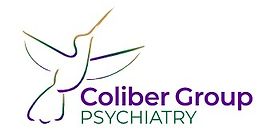Bay of Plenty, Canterbury, Central Auckland, Central Lakes, Dunedin - South Otago, East Auckland, Hawkes Bay, Hutt, Lakes, MidCentral, Nelson Marlborough, North Auckland, Northland, South Auckland, South Canterbury, Southland, Tairāwhiti, Taranaki, Waikato, Wairarapa, Waitaki, Wellington, West Auckland, West Coast, Whanganui > Private Hospitals & Specialists >
Coliber Group Psychiatry
Private Service, Mental Health
Today
Description
We provide convenient and accessible professional telepsychiatry services to help with the following conditions:
What is Mental Illness?Consultants
-

Dr Agata Moody
Psychiatrist and Advanced Clinical Hypnotherapist
Ages
Adult / Pakeke, Older adult / Kaumātua
How do I access this service?
Referral
Before an appointment can be made with Coliber, we require a referral from your GP, Nurse Practitioner, Psychologist or other Medical Professional.
Referrers: If you would like to refer a patient to Coliber we are available via secure email –
A referral form is available for download here: Referral Form
Website / App
Referral Expectations
Once Coliber receives a referral from your GP it is reviewed and when it is accepted, we will make contact with you to book an appointment for an initial consultation.
If we feel that your needs could be better met by other services, we will explain it in the letter to your referrer. You will receive a copy of this letter.
The initial consultation lasts between 60 and 90 minutes.
After the appointment, your referrer will receive a clinical report. You will receive a copy of the report.
Fees and Charges Categorisation
Fees apply
Hours
| Mon – Fri | 9:00 AM – 5:00 PM |
|---|
Languages Spoken
English, Polish
Common Conditions
This is a mood disorder in which both depressive (persistent low mood) and manic (elevated or high mood) episodes are experienced. It is usually a recurring (i.e. keeps coming back) disorder that can cause a lot of havoc in all aspects of a person’s life. People with this disorder will experience periods of extreme mood changes but also periods of stable mood during which they may be able to return to everyday routines. These changes of mood can be very extreme and occur for no apparent reason. Different people will experience this disorder in different ways; some may have few episodes, others many, and symptoms may vary from mild to severe. When severely depressed or elevated, a person can become ‘psychotic’ i.e. lose touch with reality. Treatment Usually by medication (antidepressants if depressed and mood stabilisers if depressed and manic) A combination of counselling and psychotherapy (‘talking therapy’) may hasten recovery Hospitalisation may be required for those who are very unwell and are posing a risk to themselves or to others.
This is a mood disorder in which both depressive (persistent low mood) and manic (elevated or high mood) episodes are experienced. It is usually a recurring (i.e. keeps coming back) disorder that can cause a lot of havoc in all aspects of a person’s life. People with this disorder will experience periods of extreme mood changes but also periods of stable mood during which they may be able to return to everyday routines. These changes of mood can be very extreme and occur for no apparent reason. Different people will experience this disorder in different ways; some may have few episodes, others many, and symptoms may vary from mild to severe. When severely depressed or elevated, a person can become ‘psychotic’ i.e. lose touch with reality. Treatment Usually by medication (antidepressants if depressed and mood stabilisers if depressed and manic) A combination of counselling and psychotherapy (‘talking therapy’) may hasten recovery Hospitalisation may be required for those who are very unwell and are posing a risk to themselves or to others.
- Usually by medication (antidepressants if depressed and mood stabilisers if depressed and manic)
- A combination of counselling and psychotherapy (‘talking therapy’) may hasten recovery
- Hospitalisation may be required for those who are very unwell and are posing a risk to themselves or to others.
Depression is a mood disorder. Emotional states like sadness, ‘feeling blue’ or tearfulness are part of normal human experience. Clinical depression is called Major Depression and is characterised by the presence for at least two weeks of symptoms such as depressed mood, diminished interest and pleasure in most activities, change in appetite and weight (these can be increased or decreased) sleep disturbance, fatigue, bodily symptoms (headache, backache etc) poor concentration, feelings of anxiousness, worthlessness, hopelessness, guilt, and suicidal ideation. Depression is a common disorder and about 10-20 % of the population in New Zealand will suffer from depression during their lifetime. Treatment Once depression has been diagnosed by your GP/Psychiatrist, it can be effectively treated by: Antidepressant medication Psychological interventions e.g. counselling (various types) and psychotherapy (talking therapy which is of various types).
Depression is a mood disorder. Emotional states like sadness, ‘feeling blue’ or tearfulness are part of normal human experience. Clinical depression is called Major Depression and is characterised by the presence for at least two weeks of symptoms such as depressed mood, diminished interest and pleasure in most activities, change in appetite and weight (these can be increased or decreased) sleep disturbance, fatigue, bodily symptoms (headache, backache etc) poor concentration, feelings of anxiousness, worthlessness, hopelessness, guilt, and suicidal ideation. Depression is a common disorder and about 10-20 % of the population in New Zealand will suffer from depression during their lifetime. Treatment Once depression has been diagnosed by your GP/Psychiatrist, it can be effectively treated by: Antidepressant medication Psychological interventions e.g. counselling (various types) and psychotherapy (talking therapy which is of various types).
- Antidepressant medication
- Psychological interventions e.g. counselling (various types) and psychotherapy (talking therapy which is of various types).
We all feel some anxiety at some time or other. Anxiety may serve as an alerting signal, warning us of external /internal threats and consequently acting as a prompt to take appropriate action. When anxiety is very severe and present even when there is no threat of any kind, then it interferes with our functioning and can become an illness. In this circumstance, anxiety becomes a disorder characterised by an unpleasant emotion with feelings of fear, threat and impending danger and can be associated with numerous bodily symptoms like breathlessness, trembling, tightness in throat, dry mouth, racing heart and nausea/vomiting. There are varieties of anxiety disorders like panic attacks, phobias (unhealthy fear of something), agoraphobia (fear of open spaces), social anxiety, post-traumatic disorder and obsessive compulsive disorder. Anxiety can often be associated with a depressive episode. Anxiety disorders are very common and if unrecognised and untreated, can cause severe disability. Treatment Self help: learning techniques like relaxation, distraction and education Cognitive Behavioural Therapy (CBT) Medication.
We all feel some anxiety at some time or other. Anxiety may serve as an alerting signal, warning us of external /internal threats and consequently acting as a prompt to take appropriate action. When anxiety is very severe and present even when there is no threat of any kind, then it interferes with our functioning and can become an illness. In this circumstance, anxiety becomes a disorder characterised by an unpleasant emotion with feelings of fear, threat and impending danger and can be associated with numerous bodily symptoms like breathlessness, trembling, tightness in throat, dry mouth, racing heart and nausea/vomiting. There are varieties of anxiety disorders like panic attacks, phobias (unhealthy fear of something), agoraphobia (fear of open spaces), social anxiety, post-traumatic disorder and obsessive compulsive disorder. Anxiety can often be associated with a depressive episode. Anxiety disorders are very common and if unrecognised and untreated, can cause severe disability. Treatment Self help: learning techniques like relaxation, distraction and education Cognitive Behavioural Therapy (CBT) Medication.
- Self help: learning techniques like relaxation, distraction and education
- Cognitive Behavioural Therapy (CBT)
- Medication.
Additional Details
Online / virtual / app, Speak with women / wahine, LGBTQIA+ friendly
Website
Contact Details
-
Phone
022 500 8140
Email
Website
Postal Address
PO Box 123
1 Windsor Street
Windsor
Invercargill 9810
Was this page helpful?
This page was last updated at 12:46PM on February 9, 2024. This information is reviewed and edited by Coliber Group Psychiatry.

